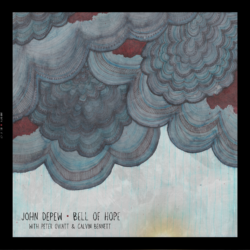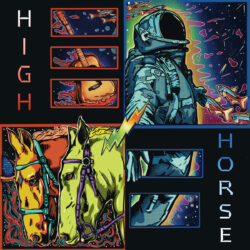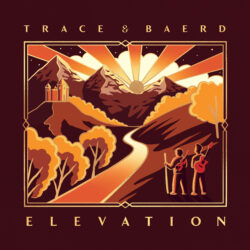
A new year arrives with a batch of albums that stretch the Bluegrass genre to it’s limits. But it’s a style that has always thrived on experimentation, so it will always bounce back, whether from the extended songs, John Depew giving us a 12 plus minute piece and High Horse offering 7-minute songs and a full suite. There is also a move towards all instrumental albums, with Charlotte Carrivick featuring in our last round up, and the excellent Up Around The Sun reviewed elsewhere, and Trace & Baerd which you hear below. Bluegrass is evolving, which is good to see. To stay fresh and current you can’t rely on the tropes of old. Country music take note.
 John Depew leads a mandolin/banjo/bass trio, with Peter Oviatt on banjo, and Calvin Bennett on bass. This is his third full length album but departs from his earlier strictly solo sound. Depew has created the trio to “weave through the margins of bluegrass-adjacency.” And while there is a lot that is recognisably Bluegrass, on ‘Piñons’ or ‘God of the Gaps’ for instance, there are also more abstract jazz elements in songs like ‘Whale’. Album title song ‘Bell Of Hope’ is one of the more adjacent songs, but also a triumph of Bluegrass picking mixed with a tune that shifts through a range of moods across nearly thirteen minutes. Bluegrass prog anyone?
John Depew leads a mandolin/banjo/bass trio, with Peter Oviatt on banjo, and Calvin Bennett on bass. This is his third full length album but departs from his earlier strictly solo sound. Depew has created the trio to “weave through the margins of bluegrass-adjacency.” And while there is a lot that is recognisably Bluegrass, on ‘Piñons’ or ‘God of the Gaps’ for instance, there are also more abstract jazz elements in songs like ‘Whale’. Album title song ‘Bell Of Hope’ is one of the more adjacent songs, but also a triumph of Bluegrass picking mixed with a tune that shifts through a range of moods across nearly thirteen minutes. Bluegrass prog anyone?
Depew says, “’Bell of Hope‘ is a record for music lovers and people who ask good questions. There are a lot of reasons to be hopeless about the world from a bird’s eye view, but on the ground, the path looks pretty straightforward to me: be good to our neighbors, take care of our friends, be kind and understanding to our children. Build the world we want from the ground up.” A traditionally rooted album that extends what we think of as Bluegrass.
 High Horse call themselves a “progressive-acoustic boy band.” Their unique combination of instruments “featuring cello as a utility infielder, at once filling in as the second “fiddle” role, then joining the rhythm section to add extra oomph,” gives them a very textured sound. ‘Tombstone Territory’ has quotes from ‘Summertime’ and other swinging jazz elements but also bursts of more typically bluegrass picking across its seven minutes. The Fiddle solo is closer to Jen Luc Ponty than Byron Berline.
High Horse call themselves a “progressive-acoustic boy band.” Their unique combination of instruments “featuring cello as a utility infielder, at once filling in as the second “fiddle” role, then joining the rhythm section to add extra oomph,” gives them a very textured sound. ‘Tombstone Territory’ has quotes from ‘Summertime’ and other swinging jazz elements but also bursts of more typically bluegrass picking across its seven minutes. The Fiddle solo is closer to Jen Luc Ponty than Byron Berline.
The fiddle appears again as a prelude to ‘Holy Water,’ which features Jacqui Armbruster’s Celtic vocals with coral harmonies form the band, on an intimate tune where Karl Henry’s Cello is allowed a solo spot. The four-part suite which makes up the latter half of the album is a great showcase for their unique sound. “Beginning with a gentle, wind-swept texture evocative of Western movie music, the second part adds a muscularity as the texture thickens and the tempo quickens; the third part of the journey finds High Horse in wistful repose.” An album which builds on the Bluegrass legacy without disrespecting it.
 ‘Elevation,’ the debut album from “Americeltic” duo Trace & Baerd, is a musical journey there and back again. They say that this is “one fiddle, one guitar, all original, all instrumental, no multitracking, no metronome. Just two music makers (or three since producer Brittany Haas joins in on second fiddle for two tracks) playing in-step and in the moment.
‘Elevation,’ the debut album from “Americeltic” duo Trace & Baerd, is a musical journey there and back again. They say that this is “one fiddle, one guitar, all original, all instrumental, no multitracking, no metronome. Just two music makers (or three since producer Brittany Haas joins in on second fiddle for two tracks) playing in-step and in the moment.
The Celtic influence kicks in with second tune ‘Cornish Game Hen.’ A dance tune that blends bits of reel and jig which could easily come from a village hall in that very county. ‘Train To Miyazaki’ is a lightly picked tune which has a recognisably Japanese touch, with the fiddle picking sounding a bit like a Koto and the solo in quarter notes being very oriental.
This is very much an American take on Celtic music with the sounds being as much English folk as Irish or Scottish. ‘The Follies of Something’ where the two fiddles weave around each other is a tune that could be heard in any folk club in the South of England any Friday night. The Bluegrass element of the album is in the interaction of the players, trading of each other and taking clusters of notes and building on them. It’s yet another demonstration of the way genre’s blend and become almost irrelevant to what is in the end just good music.
 Max Wareham tours with the Peter Rowan Bluegrass Band, but ‘Daggomit!‘ Is his debut solo album, produced by his boss. This is the resolutely traditional end of Bluegrass. ‘Lonesome Blues, I’m Coming Home’ fits the template to a tee. A blues lyric, over intricate picking and soloing that drives the tune. As a historian of the Banjo and writer of a book on Rudy Lyle called ‘The Unsung Hero of the Five String Banjo’ he is clear about what makes for good Bluegrass. ‘The Black & Gold’ is blistering instrumental. Fiddle, mandolin, guitar, and Banjo all take turns to outdo each other for speed and precision over three minutes of Bluegrass perfection.
Max Wareham tours with the Peter Rowan Bluegrass Band, but ‘Daggomit!‘ Is his debut solo album, produced by his boss. This is the resolutely traditional end of Bluegrass. ‘Lonesome Blues, I’m Coming Home’ fits the template to a tee. A blues lyric, over intricate picking and soloing that drives the tune. As a historian of the Banjo and writer of a book on Rudy Lyle called ‘The Unsung Hero of the Five String Banjo’ he is clear about what makes for good Bluegrass. ‘The Black & Gold’ is blistering instrumental. Fiddle, mandolin, guitar, and Banjo all take turns to outdo each other for speed and precision over three minutes of Bluegrass perfection.
Single ‘Hard Times Are Far Behind’ has been built for airplay and deserves that recognition as does the whole album. We need albums like this which respect and enhance the traditions to remind us that it isn’t necessary to pull the genre to pieces in order to produce vital new music. Wareham is deeply invested in the history of his music, and in other places working on archaeological digs and translating medieval poetry. This is an album that should be heard by anyone who is stuck listening to their old Bill Monroe albums complaining that they don’t make them like that anymore.


